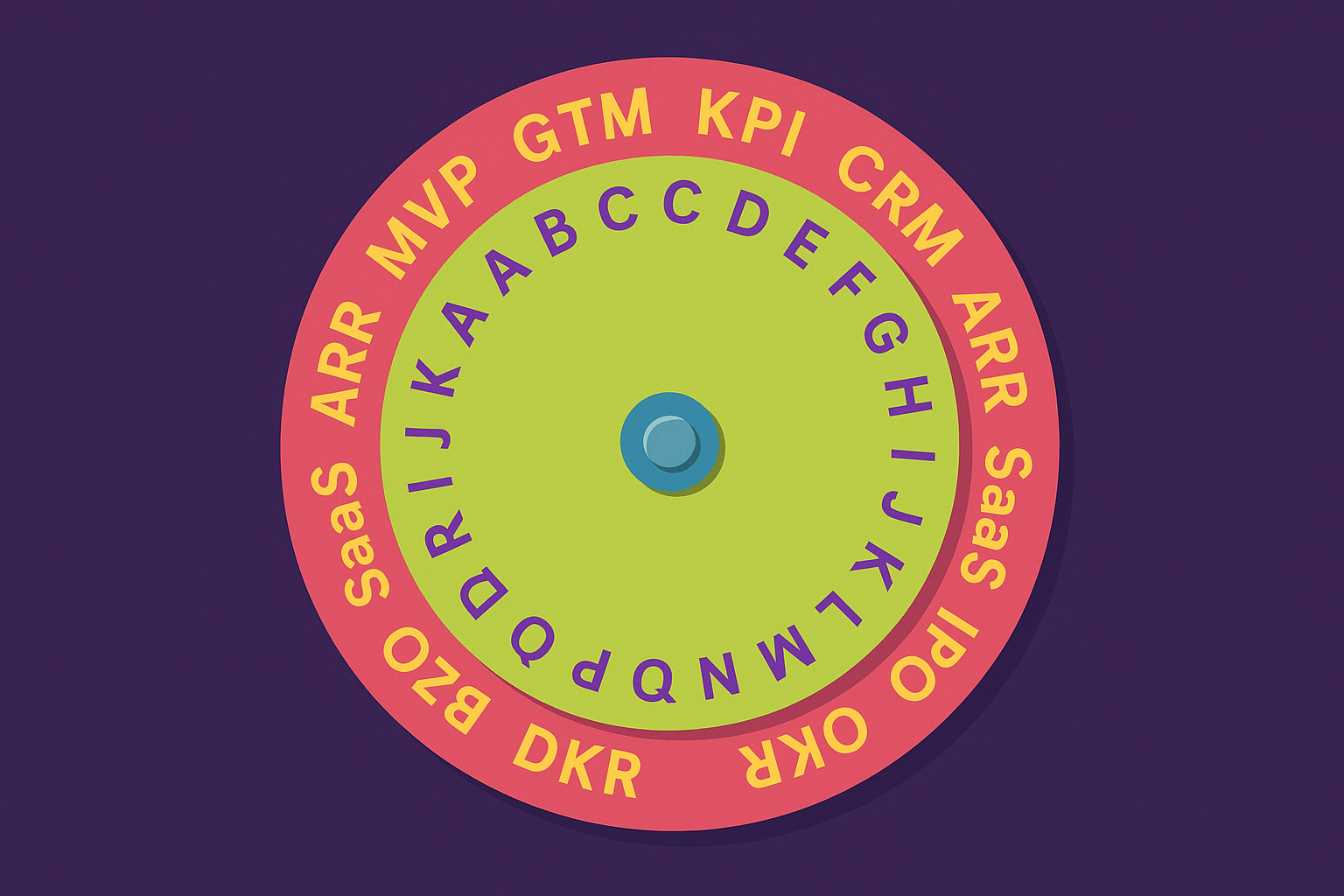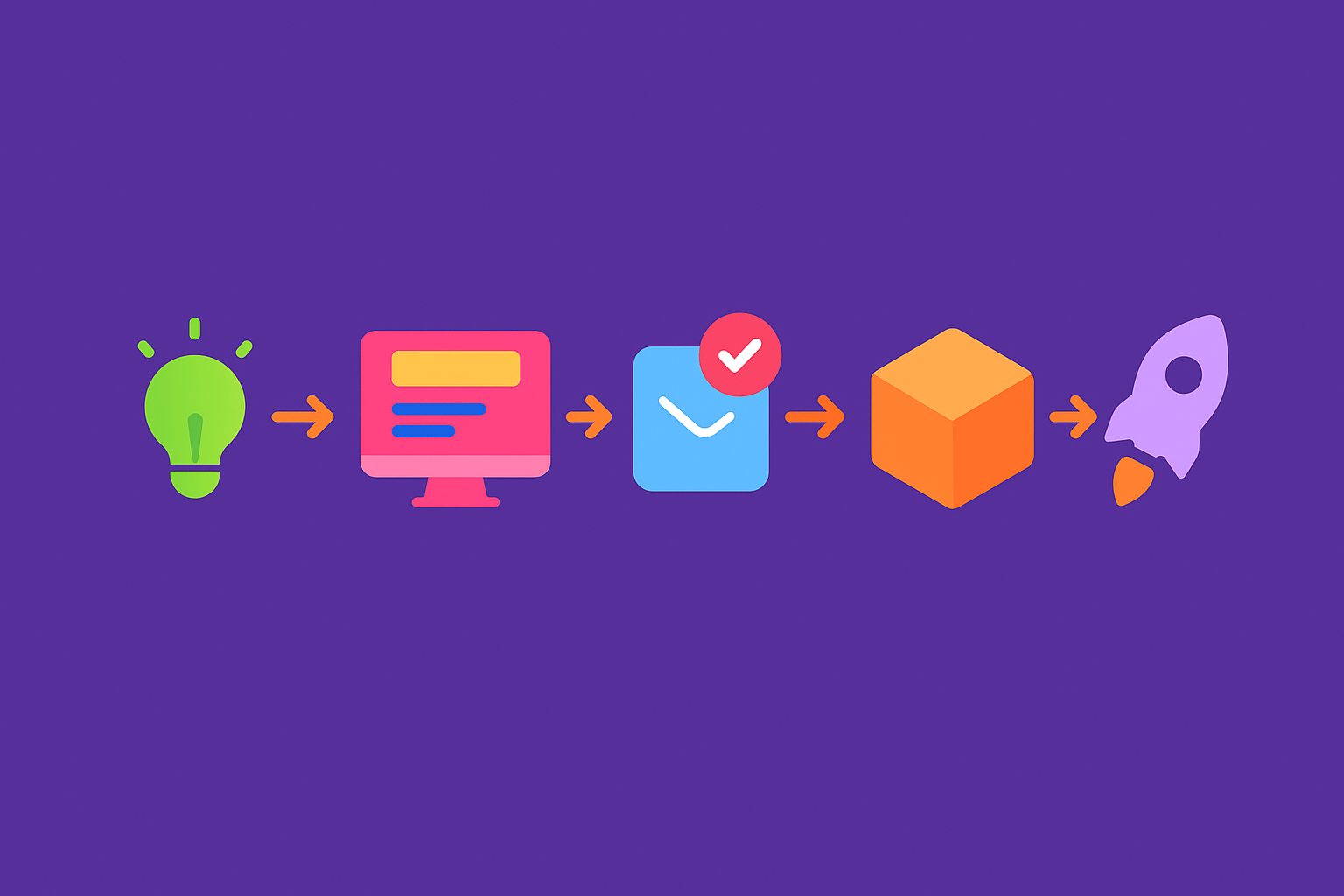You walk into your first investor meeting, feeling confident about your brilliant idea. Then someone asks, "What's your MVP timeline for your ICP? Will you go B2B or B2C? And what's your TRL?"
Suddenly, you feel like you need a translator. Don't worry – you're not alone! The startup world loves its acronyms, and everyone assumes you speak fluent "startup shorthand."
Here's your cheat sheet to the most important acronyms every founder needs to know.
Product Development & Technology
MVP - Minimum Viable Product This isn't about being lazy – it's about being smart. Your MVP is the simplest version of your idea that still works and shows people what you're trying to do. Think of it like a rough sketch before painting the masterpiece.
POC - Proof of Concept Before you build anything big, you need a POC – basically a simple test to prove your idea actually works. It's like making a paper airplane before designing a real plane.
NRE - Non-Recurring Engineering This is the one-time cost to design and build something completely new. Think of it like paying someone to create the first mold for a toy – you only pay once, but then you can make lots of toys.
TRL - Technology Readiness Level This is a scale from 1-9 that shows how ready your technology is:
- 1 = "I have this crazy idea!"
- 5 = "We built a working model!"
- 9 = "People are buying it in stores!"
ARL - Adoption Readiness Level Similar to TRL, but this measures how ready people are to actually use your technology. You might have amazing tech (high TRL), but if people aren't ready for it (low ARL), you've got a problem.
AI - Artificial Intelligence Computer programs that can think and learn like humans. From chatbots to recommendation engines, AI is everywhere now.
API - Application Programming Interface Like a waiter between two apps – it helps them talk to each other and share information. Your food delivery app uses APIs to talk to the restaurant's system.
SaaS - Software as a Service Computer programs you use on the internet instead of installing on your computer. Think Google Docs, Netflix, or Spotify – you pay monthly and use it online.
CI - Continuous Integration A way for programmers to constantly check and improve their work. It's like having a spell-checker that runs automatically every time you write code.
IP - Intellectual Property Ideas, inventions, or creative work that belong to someone. This includes patents, copyrights, and trademarks – basically, the legal protection for your brilliant ideas.
AWS - Amazon Web Services Amazon's business that helps other companies with computer and internet services. It's like renting Amazon's super-powerful computers instead of buying your own.
UI/UX - User Interface/User Experience UI is what users see, UX is how it feels to use your product.
Customer & Market Strategy
ICP - Ideal Customer Profile This is a detailed description of the perfect person who would want to buy your product. Not just "everyone" – be specific! Think age, job, problems they face, and how much they're willing to spend.
B2B - Business-to-Business When companies sell to other companies. Like a bakery selling flour to restaurants.
B2C - Business-to-Consumer When companies sell directly to regular people. Like that same bakery selling cookies to you.
TAM - Total Addressable Market The total amount of money your entire industry makes. Think "How big is the pizza market?"
SAM - Serviceable Addressable Market The slice of TAM you could realistically reach with your product.
SOM - Serviceable Obtainable Market The piece of SAM you can actually capture with your current resources.
PMF - Product-Market Fit When you've built something people actually want and will pay for. The holy grail of startups.
GTM - Go-to-Market Your plan for how you'll sell and deliver your product to customers.
Financial Metrics & Money
CAC - Customer Acquisition Cost How much money you spend to get one new customer. If you spend $100 on ads and get 10 customers, your CAC is $10.
LTV - Lifetime Value How much money one customer will spend with you over their entire relationship with your company.
MRR - Monthly Recurring Revenue The predictable income you get every month from subscriptions or recurring customers.
ARR - Annual Recurring Revenue Like MRR, but for the whole year. It's what investors love to see growing.
ROI - Return on Investment How much money you get back compared to what you spent. If you invest $100 and make $150, your ROI is 50%.
Burn Rate How fast you're spending money each month. If you have $100,000 and spend $10,000 per month, you have a 10-month runway.
Runway How long your money will last at your current burn rate. Critical for planning fundraising.
Churn Rate The percentage of customers who stop using your product each month. Lower is better.
Investment & Funding
VC - Venture Capital/Venture Capitalist These are people who give money to new businesses they think will grow big and make lots of money. They're basically professional risk-takers who bet on startups.
SAFE - Simple Agreement for Future Equity A way for someone to give you money now and get part ownership of your company later. It's like an IOU that says "pay me back with company shares when you're successful."
MFN - Most Favored Nation A rule that protects early investors. If you give someone a better deal later, your first investor automatically gets that same good deal. It keeps things fair.
IPO - Initial Public Offering When a private company decides to let anyone buy shares and become part owners. It's like opening your lemonade stand to the whole neighborhood as investors.
M&A - Mergers and Acquisitions When companies join together (merger) or one company buys another (acquisition). Think of it like business marriages or adoptions.
Term Sheet Not an acronym, but crucial! The document that outlines the basic terms of an investment deal.
Due Diligence When investors thoroughly check out your company before giving you money. Like a very detailed background check.
Business Operations & Management
KPI - Key Performance Indicator The important numbers you track to see if your business is doing well.
CRM - Customer Relationship Management Software that helps you keep track of your customers and sales.
ERP - Enterprise Resource Planning Software that helps big companies manage all their business processes in one place.
HR - Human Resources The people at a company who hire workers and handle employee problems. They're like the company's people managers.
DAU/MAU - Daily/Monthly Active Users How many people actually use your product each day or month. Different from total signups.
Q1, Q2, Q3, Q4 - Quarters The four parts of a business year:
- Q1: January-March
- Q2: April-June
- Q3: July-September
- Q4: October-December
Legal & Compliance
NDAs - Non-Disclosure Agreements Legal papers that say "don't tell anyone about our secret stuff."
FDA - Food and Drug Administration The government group that makes sure food and medicine are safe before they reach customers.
SEC - Securities and Exchange Commission The government group that watches over the stock market and makes sure companies follow the rules.
DOE - Department of Energy The part of the US government that deals with energy and power.
OTT - Office of Technology Transition A group inside the Department of Energy that helps new technologies get from labs to real markets.
Why Does Everyone Use These Shortcuts?
Think of acronyms like texting shortcuts – instead of typing "laugh out loud," you just write "LOL." In the startup world, these shortcuts help people communicate faster, but they can also make newcomers feel left out.
The truth is, most successful founders didn't know these terms when they started. They learned them along the way, just like you're doing now.
Your Acronym Action Plan
- Don't panic when you hear unfamiliar acronyms in meetings
- Ask for clarification – most people appreciate honesty over pretending
- Keep this list handy for quick reference
- Practice using them in context, but don't force it
Remember, knowing these acronyms won't make your startup successful, but not knowing them might make important conversations confusing. It's like learning the basic vocabulary of a new language – you need it to communicate effectively.
The startup world might seem like it has its own secret language, but now you're in on the code. Use these acronyms when they fit naturally, but don't worry about sounding like a walking dictionary. Focus on building something people want – that's what really matters.
Ready to turn your startup idea into reality? Understanding the language is just the first step. Get in touch with us for expert guidance on all your software development and fractional CTO needs. We speak fluent startup – and we'll translate everything into plain English for you!











